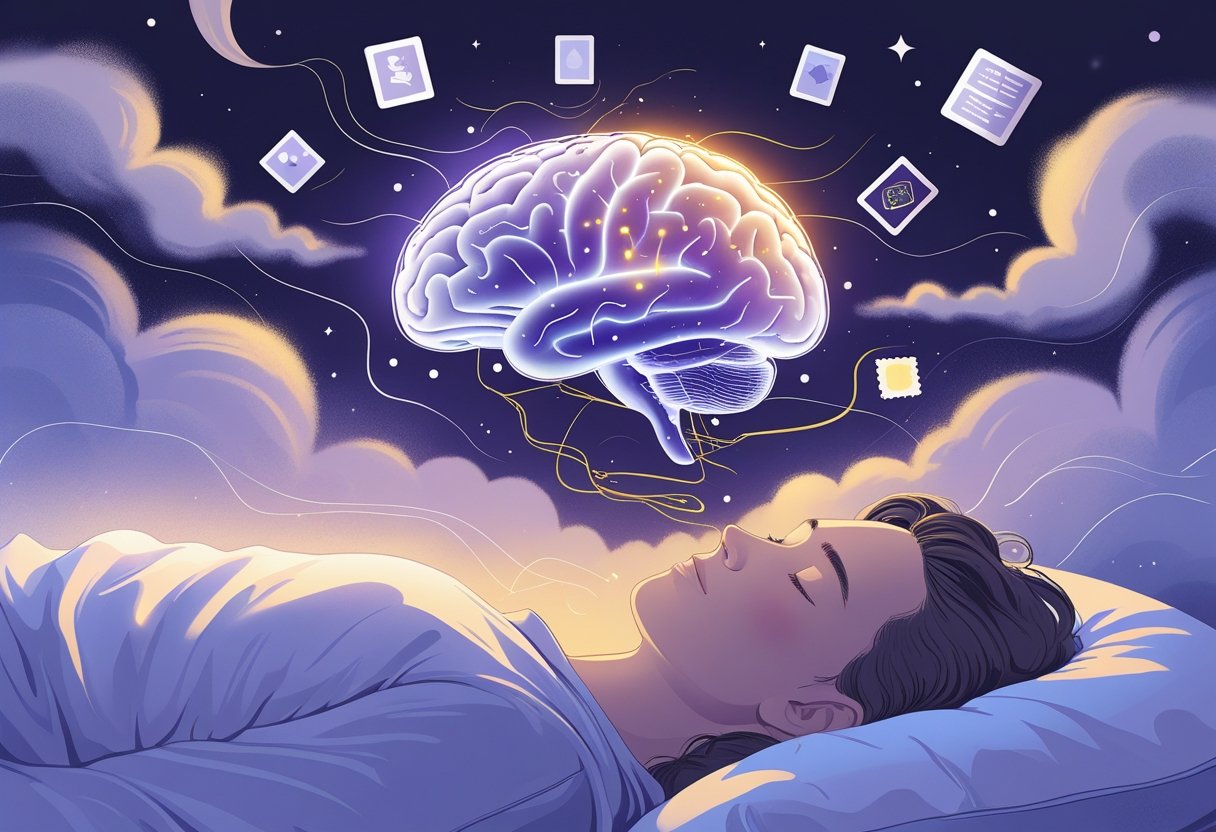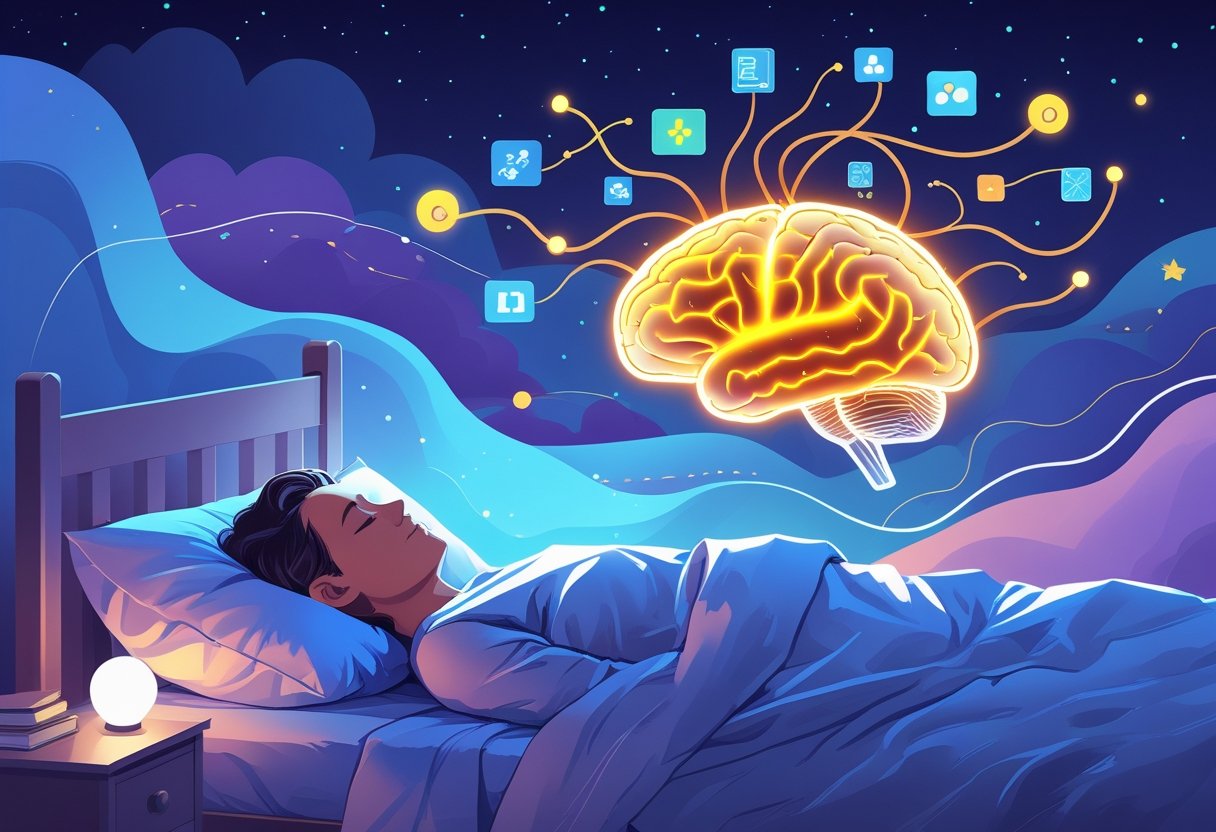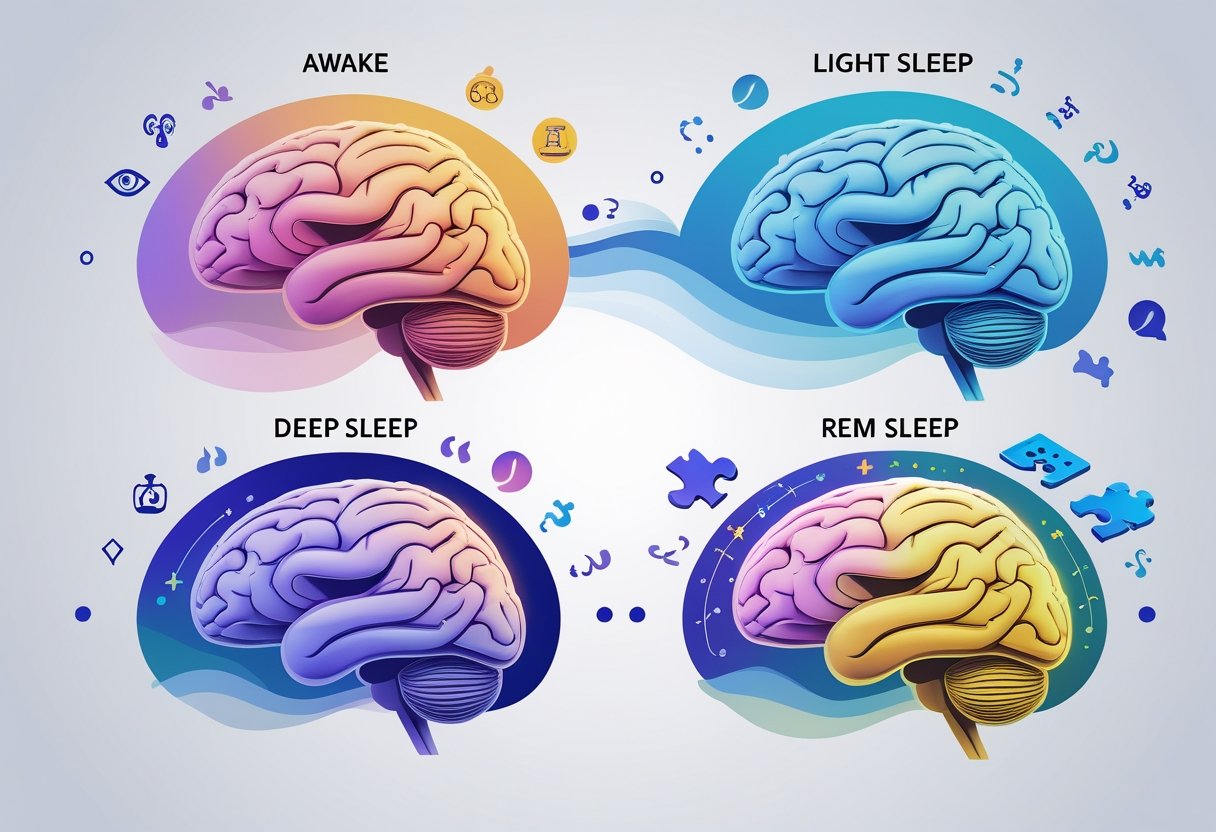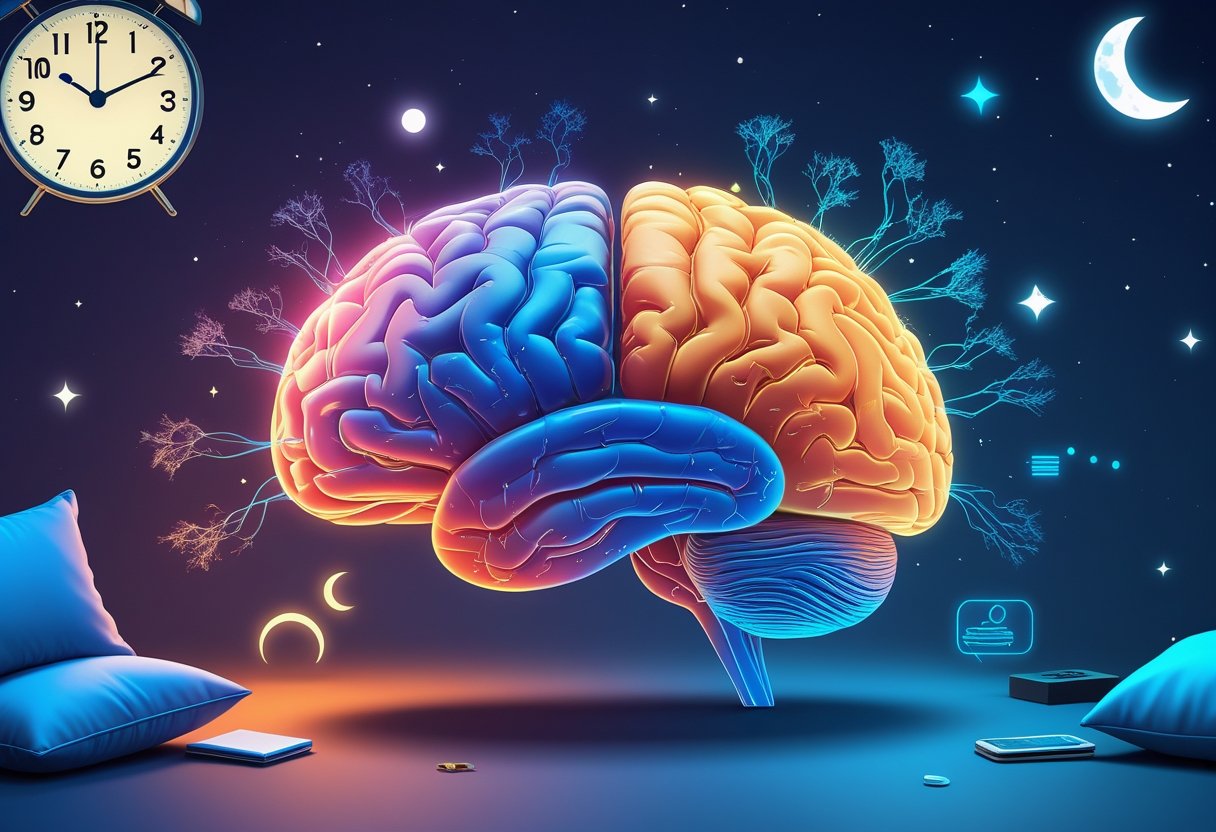Sleep affects how the brain stores and processes memories. Without enough rest, the brain faces challenges in organizing information and retaining new experiences. Sleep strengthens memories by letting the brain consolidate what it learned throughout the day.
Various sleep stages work together to support different types of memory, such as facts, skills, and emotions. When sleep is cut short or disturbed, these memory processes get weaker and make it harder to recall information or learn new things. Improving sleep quality can directly enhance memory and cognitive abilities. Changes to habits and the environment usually make a difference in how well sleep supports the brain’s memory functions.
Key Takeaways
- Sleep helps the brain store and organize memories.
- Lack of sleep weakens memory and learning ability.
- Better sleep habits lead to stronger memory performance.
- A mattress that provides proper support and comfort helps you achieve restorative sleep, which is essential for effective memory consolidation and mental clarity.

Understanding the Connection Between Sleep and Memory

Sleep is vital for how the brain processes and stores information. Different sleep phases support specific memory tasks, which help transform short-term memories into long-lasting ones. The quality and amount of sleep directly influence memory clarity and learning ability.
How Does Sleep Affect Memory
Sleep impacts memory by allowing the brain to organize and strengthen new information. During sleep, especially in Non-Rapid Eye Movement (NREM) and Rapid Eye Movement (REM) stages, the brain sorts through daily experiences. It preserves important memories while discarding unnecessary details.
Lack of sleep diminishes the brain’s ability to recall details clearly and accurately. People who miss sleep often struggle to learn new skills or remember facts. Sleep keeps memory sharp by maintaining communication between different brain regions responsible for storing information.
What Role Does Sleep Play in Memory Formation?
Sleep supports memory formation by stabilizing and integrating new information. When someone learns something new, the brain temporarily stores it in short-term memory. Sleep then transfers this information into long-term memory and makes it easier to retrieve later.
Both NREM and REM sleep serve key roles. NREM sleep facilitates the transfer of facts and events into long-term storage. REM sleep helps connect these memories to emotions and existing knowledge. Together, this process improves understanding and retention over time.
How Does Sleep Improve Memory
Sleep improves memory by consolidating information and enhancing brain function. During sleep, the brain replays learned experiences to strengthen neural connections. This replay solidifies memories and prepares the brain for new learning.
Adequate sleep also removes harmful brain chemicals that accumulate during waking hours, protecting memory circuits. Consistent, high-quality sleep boosts attention, problem-solving, and overall cognitive abilities. These benefits help individuals perform better in tasks that rely on memory.
Stages of Sleep and Memory Consolidation
Sleep plays a key role in how memories become stable and useful. Different parts of sleep help with different memory tasks, such as storing facts or skills. Understanding these processes helps explain why good sleep is needed for learning and memory.
Which Stage of Sleep Is the Most Crucial for Memory Formation?
Memory consolidation occurs mainly during two sleep stages: non-rapid eye movement (NREM) and rapid eye movement (REM) sleep. Within NREM, the slow-wave sleep (deep sleep) phase holds particular importance for consolidating facts and knowledge. This stage features slow brain waves that strengthen and organize memories.
REM sleep supports the processing of emotional and procedural memories, such as skills or habits. Both stages contribute but in different ways depending on the type of memory being formed.
Key points:
- Slow-wave sleep in NREM proves crucial for declarative memory (facts, events).
- REM sleep aids procedural memory (skills, emotional memories).
- Disruption of either stage can harm memory formation.
What Happens to Memories While You Are Sleeping
During sleep, the brain replays and processes new information gathered while awake. This replay strengthens important memories and discards unnecessary details.
Brain activity during slow-wave sleep allows neurons to communicate in patterns that stabilize memory traces. Meanwhile, REM sleep helps integrate memories with existing knowledge and emotions.
Memory consolidation involves a cycle of reactivation and reorganization. This process transfers memories from short-term storage in the hippocampus to long-term storage in the cortex, making them more permanent and easier to recall.
Sleep supports:
- Stabilizing new memories
- Strengthening brain connections involved in learning
- Filtering out irrelevant information
Research shows that without proper sleep, especially in stages involved in consolidation, memories weaken and become less reliable.

The Impact of Sleep Deprivation on Memory
Sleep deprivation impacts various types of memory, including the ability to learn new information and recall past experiences. Even brief periods of reduced sleep weaken memory formation and make retaining information more difficult. The severity of these effects depends on the length of sleep loss and the type of memory involved.
Lack of Sleep and Memory Loss
When a person gets insufficient sleep, both short-term and long-term memory decline. Research shows that losing just 3 to 4 hours of sleep in one night lowers memory performance. Sleep allows the brain to store and organize memories, so cutting sleep short leads to weaker memory consolidation.
People experiencing frequent sleep loss usually struggle to focus, recall facts, and acquire new skills. Tasks relying on procedural memory, such as riding a bike or typing, also suffer. Chronic sleep restriction slows reaction time and diminishes brain function, resulting in more mistakes and forgetfulness.
Can Lack of Sleep Cause Memory Loss?
Sleep deprivation can cause forgetfulness but does not always cause permanent memory loss. Most memory difficulties improve once normal sleep patterns resume. Still, persistent sleep problems increase the risk of lasting memory impairment and cognitive decline.
Short-term sleep loss mainly hinders the brain’s ability to encode or learn new memories. When sleep deprivation becomes chronic, the brain faces greater challenges in both retaining old memories and forming new ones. This situation may increase the risk of developing conditions like Alzheimer’s disease later in life.
- Acute sleep loss: affects focus and mental sharpness
- Chronic sleep restriction: may cause long-term cognitive decline
- Memory types affected: procedural, working, and long-term memory

Sleep, Learning, and Memory Enhancement
Sleep affects how the brain processes new information and stores memories. It influences both the ability to learn and the strength of memory by supporting brain activity and clearing distractions. The quality and type of sleep determine how well people remember and apply what they have learned.
Sleep and Learning
Sleep plays a crucial role in learning ability. During sleep, the brain processes information from the day, sorting important facts and skills for easier recall. Studies reveal that even one night without enough sleep lowers working memory, which proves essential for planning and reasoning.
Different sleep phases, such as REM and deep sleep, support learning in unique ways. REM sleep allows the brain to work through problems creatively, enhancing understanding and problem-solving. Deep sleep strengthens the brain’s ability to store facts and skills by quietly replaying them.
Sleep’s Role in Memory Improvement
Sleep actively enhances memory by improving how memories store and remain over time. It prevents the brain from forgetting important details too quickly. One study showed that sleep helps the brain focus on the order of events (sequence memory), a critical skill for following instructions or mastering steps.
Additionally, sleep reduces interference from new information, giving the brain time to reinforce older memories without overload. When a person sleeps well, both short-term and long-term memory accuracy improve, resulting in better performance on tests or daily tasks.

Sleep’s Role in Different Types of Memory

Sleep affects how the brain handles different kinds of memories. It strengthens some memories for long-term use and supports others by keeping them active briefly. Different sleep stages serve distinct roles in these processes.
Sleep and Long-Term Memory
Long-term memory improves significantly with sleep, especially during deep sleep or slow-wave sleep (SWS). During this phase, the brain replays important information learned throughout the day, which strengthens memories and makes them easier to recall later. This process is known as memory consolidation.
REM sleep contributes as well by helping organize memories and linking new information with existing knowledge. Both slow-wave and REM sleep play a part, but each targets different types of memories.
Getting quality sleep after learning remains crucial. Research shows that people who sleep well recall information, such as facts or skills, better than those who stay awake. Sleep spindles, a type of brain wave appearing in stage 2 sleep, help filter out irrelevant details while reinforcing useful memories.
Sleep and Short-Term Memory
Short-term memory depends on sleep differently. It involves temporarily holding information before deciding whether to store it long-term. Sleep clears out unnecessary short-term data, preparing the brain to absorb new information.
Light sleep and stage 2 sleep aid in organizing short-term memories. These stages enable the brain to process and sort recent experiences so only relevant details advance. Sleep deprivation disrupts this process. When sleep is short or absent, people struggle to maintain or manage short-term details. This highlights sleep’s role in sustaining attention and memory during daily activities, not only in supporting long-lasting learning.
Practical Recommendations for Better Sleep and Memory
Improving sleep quality directly enhances memory and learning. A consistent routine and attention to sleep issues protect against memory decline and support sharper thinking.
Healthy Sleep Habits for Memory Support
A regular sleep schedule plays a key role in cognitive function. Adults need 7 to 9 hours of sleep each night to allow proper memory consolidation. Going to bed and waking up at the same time every day strengthens the body’s internal rhythm.
A restful environment also matters. Keep the bedroom dark, quiet, and cool. Avoid screens and bright lights for at least an hour before bed to prevent interference with natural sleep cycles. Limiting caffeine and heavy meals late in the day also supports better sleep. Simple routines like reading or light stretching help the body wind down.
These habits encourage deeper and uninterrupted sleep, which strengthens the brain’s ability to store and organize information.
Managing Sleep Disorders to Improve Memory
Conditions like sleep apnea or restless leg syndrome disrupt sleep and negatively affect memory. Common warning signs include loud snoring, constant fatigue, and frequent nighttime awakenings.
Getting medical guidance leads to proper diagnosis and treatment. CPAP machines may ease apnea, while medications can relieve restless leg symptoms. Treating these issues can result in better sleep and sharper memory. Unchecked sleep problems place extra strain on the brain. Managing them helps restore healthy sleep cycles and supports the memory processes that occur during deep rest.

How Your Mattress Affects Sleep Quality and Memory
Sleep quality directly affects memory, focus, and cognitive function. When you get enough restful sleep, your brain processes and stores information more effectively. In contrast, poor sleep disrupts concentration and makes it harder to retain details.
Different mattress materials provide varying levels of support and comfort. For instance, memory foam contours to the body and reduces pressure points, which helps prevent aches and restless nights. Innerspring options offer firmer and more traditional support.
Comfort and spinal alignment are very important. A mattress that keeps the spine in a neutral position helps ease pain and prevents frequent waking. Fewer disruptions allow for longer and deeper sleep, an important factor in memory consolidation. Temperature control also matters. Some mattresses trap heat, which can break sleep. Others, like Puffy Lux mattress, are designed with cooling layers to help maintain a more comfortable sleep environment.
What sets the Puffy Lux mattress apart is its focus on pressure relief and back support. With a responsive and contouring surface and a breathable design, it supports multiple sleep positions while keeping movement from spreading across the bed. It’s especially useful if you share your bed and want undisturbed sleep throughout the night.
A quick list of mattress effects on sleep and memory:
- Supports proper spinal alignment
- Reduces body pressure points
- Improves comfort and relaxation
- Helps regulate body temperature
- Promotes longer and deeper sleep
Better sleep quality lowers stress and supports key brain functions like attention and memory. Choosing the right mattress contributes to healthier sleep habits overall.

Frequently Asked Questions
Sleep supports the brain’s ability to store and strengthen memories. Each sleep stage is important in forming and retaining what we learn. When sleep is disrupted or inadequate, memory issues may arise, but proper rest usually restores clarity and recall.







